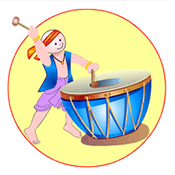
Dimdima
Online Children's Magazine from India

Dimdima
Online Children's Magazine from India
| The Monk Who Shook The Nation |
|
|
Vivekananda identified himself with the masses. "Give them bread not religion,"
he thundered. "Where should one go to seek for God? Are not all the poor, the
miserable, the weak, God?" he asked. "The poor, the ignorant, the illiterate,
the afflicted —let these be your God : know that service to these is the highest
religion," he proclaimed,
Vivekananda played a significant role in hammering India into a nation.
"Who cares for your Bhakti and Mukti?" the monk once exclaimed. "I will go into
a thousand hells cheerfully, if I can rouse my countrymen, immersed in tamas
(darkness) to stand on their feet."
"For the next fifty years," he said elsewhere, "this alone shall be our
keynote—this, our great Mother India. Let all other vain gods disappear for that
time from our minds."
By projecting the concept of Mother India, Swami Vivekananda gave Indians a
cause which transcended the barriers of caste and community.
He earnestly believed that Hindus and Muslims had to come together to build the
nation.
In one of his letters he wrote : "For our motherland a junction of the two great
systems, Hinduism and Islam – Vedanta Brain and Islam Body – is the only hope.
"I see in my mind's eye the future perfect India rising out of this chaos and
strife, glorious and invincible with Vedanta Brain and Islam Body."
| ||
Dimdima is the Sanskrit word for ‘drumbeat’. In olden days, victory in battle was heralded by the beat of drums or any important news to be conveyed to the people used to be accompanied with drumbeats.
Bharatiya Vidya Bhavan
K. M Munshi Marg,
Chowpatty, Mumbai - 400 007
email : editor@dimdima.com
Bharatiya Vidya Bhavan
505, Sane Guruji Marg,
Tardeo, Mumbai - 400 034
email : promo@dimdima.com
Dimdima.com, the Children's Website of Bharatiya Vidya Bhavan launched in 2000 and came out with a Printed version of Dimdima Magazine in 2004. At present the Printed Version have more than 35,000 subscribers from India and Abroad.